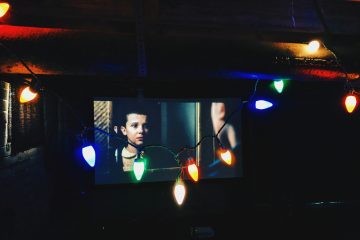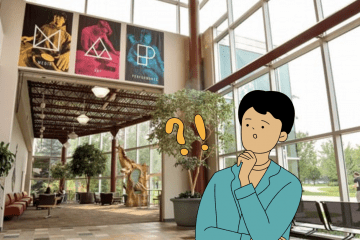Admin unsure where data goes
Proctortrack e-proctoring software, aka the university mandated nanny cam is something a lot of students have been seeing in their classes this semester.
Proctortrack describes themselves on their website as “the only automated online remote proctoring solution that continuously verifies the identity of online test-takers, while detecting and deterring academic misconduct.” It begins by having students take their exam through a Proctortrack-enabled exam link. It will then prompt them to download the Proctortrack software. Proctortrack then uses biometric authentication to verify the identity of students, which, according to their website requires a face, ID, and knuckle scan (although the Associate Dean of Arts Joseph Piwowar, denies the use of a knuckle scan) which is going to be “measured against the student’s baseline biometric profile, which is stored on file.”
Proctortrack then monitors the visual and audio feed from the student’s computer through the rest of their exam to make sure they are not doing things like looking away from the computer screen, leaving the room, having someone from outside the room shouting answers to them, or having someone else enter their room.
Proctortrack finishes by saying that the data gathered from their monitoring the exams will be sent to their servers, before being sent to the instructors for review, after which “it will be purged in accordance with the data retention policy to which your institution agreed” according to their website.
Of course, this concerns many students, particularly with the threat, “if your computer setup does not meet these specifications [required to run Proctortrack] then you should withdraw from this course and speak with an Academic Advisor from your faculty or college for advice on other courses you could take” posted on some syllabi in different classes.
Many students voiced concerns in regards to this e-proctoring software. In an interview with Julian Wotherspoon, a parent, student, and Outreach & Events Coordinator of the Regina Public Interest Research Group (RPIRG), she had this to say about the e-Proctoring software:
“My issue is with the university, and the university taking away my consent to disagree with this, by putting my degree on the line.… If cheating is becoming an issue, they need to address why it’s an issue. Let’s adapt to that, not buy expensive things to force people to use that are violating, and police them like they’re in a classroom. The other issue is cost; you’re telling me there is nothing else [the university] could spend this money on?”
Wotherspoon was also concerned about how some professors were treating parents who had kids at home. “At home the complication for me is I can’t set aside three hours to an exam without looking away from the screen. Just in a one-hour class I have had to look away three times just to do little things like finding a shoe or stop the dog barking.” When she voiced her concerns to her professor the response she got was “It’s like any exam, you can’t leave the exam room.” And she was told to “get childcare”.
Unfortunately, in a world currently going through a pandemic, childcare is harder than ever for parents to get, particularly if you live in an immunocompromised household, where they might not feel comfortable handing their children off to someone else, in case they come back sick.
Students are worried about how exams could look with this software, and many are arguing that it isn’t allowing students to do what they need in order to be successful. For example, students can’t get up to go grab water or use the washroom in the middle of an exam, something that was allowed in in-person exams is now being restricted while a person is in their own home.
In an interview with Piwowar, the Associate Dean at the Faculty of Arts defended the use of e-proctoring software by saying this:
“e-proctoring was deemed necessary to keep the integrity of our programs and degrees. A degree from the University of Regina has value because the exams have been held in a proper and vigilated way.… Sometimes that requires having to write an exam in a closed book way just to demonstrate knowledge and this is to make sure some bad apples in the group aren’t taking advantage of that.”
However, he went on to say “we encourage student instructors to think of other ways to measure students learning and it’s up to instructors to decide what measure they would like to use … not every instructor and every course is using it.” He said the Faculty of Arts was having a survey on who is using this software, but he suspects that less than a quarter of classes are using it.
Piwowar continued by saying, “We understand life situations … the instructor has the ability to review the exam and they can see what happens so there shouldn’t be an issue. If a student ever comes to an instructor who doesn’t believe them … take it up with the associate dean.”
In a classroom of 50 or more students some students are concerned they will be accused of cheating unfairly. If a student gets flagged every time they look away from the screen or the computer detects some background noise (because in what world are households going to be completely quiet for the duration of a three hour exam) at what point do the teachers stop trying to validate cheating?
When asking Brett Dolter, a teacher using the e-proctoring software, he said that TAs “could potentially help review footage.” This of course brings to mind some privacy concerns. Not only is this company being allowed access into a person’s home through their camera and microphone, but teachers and TAs get access as well. In Zoom, a student can put on a background if they would prefer to keep things anonymous, but that is not allowed while using e-proctoring software.
Most concerning, when asked about the data retention policy and what could happen to the data collected by Proctortrack, Piwowar responded by saying “The best answer you’ll get is from Art Exner … but I can say it is being stored in Canada so it is not subject to the Patriot Act.” While that relieves some concerns, when asking Art Exner, University of Regina Information Services, about the data retention policy, I was referred to Paul Dederick, University Advancement and Communications, who responded by saying “We are currently in the process of meeting with IS and our Privacy Office in order to gather information regarding the many questions around e-proctoring. This is going to take some time for us to look into.”
This raises concerns that the university doesn’t know off hand what is happening with the students audio-visual data, something that should have been determined before an agreement was made. They also refused to comment on if the e-proctoring software cost is part of the “remote learning” fee many students are seeing on their tuition.
Shae Sackman, a student at the University of Regina, was particularly concerned with what could be done with this information. “If you have test data for 100,000 students and you decide to say, racially profile those students and break them into what patterns are visible in different ethnicities you could very easily develop tests and exercises that would perhaps favour a certain kind of profile of person. Say Proctortrack partners with Pearson, who is a large, unethical educational institution testing company that issues standardized tests and assessments.… We’re literally paying to build a database of info on us to be used for unknown purposes later.”
This story will be continued next week after a series of follow up interviews with the university. In the meantime, voice your concerns to your teachers and deans about e-proctoring software. Every student should have the right to privacy within their own home, and shouldn’t be required to share their information to a third-party company in order to receive their degree.








[…] Online proctoring software is invasive, intrusive, untested(Carillon article by Isaac Tamlin, September 11, 2020 […]
[…] Online proctoring software is invasive, intrusive, untested(Carillon article by Isaac Tamlin, September 11, 2020) […]